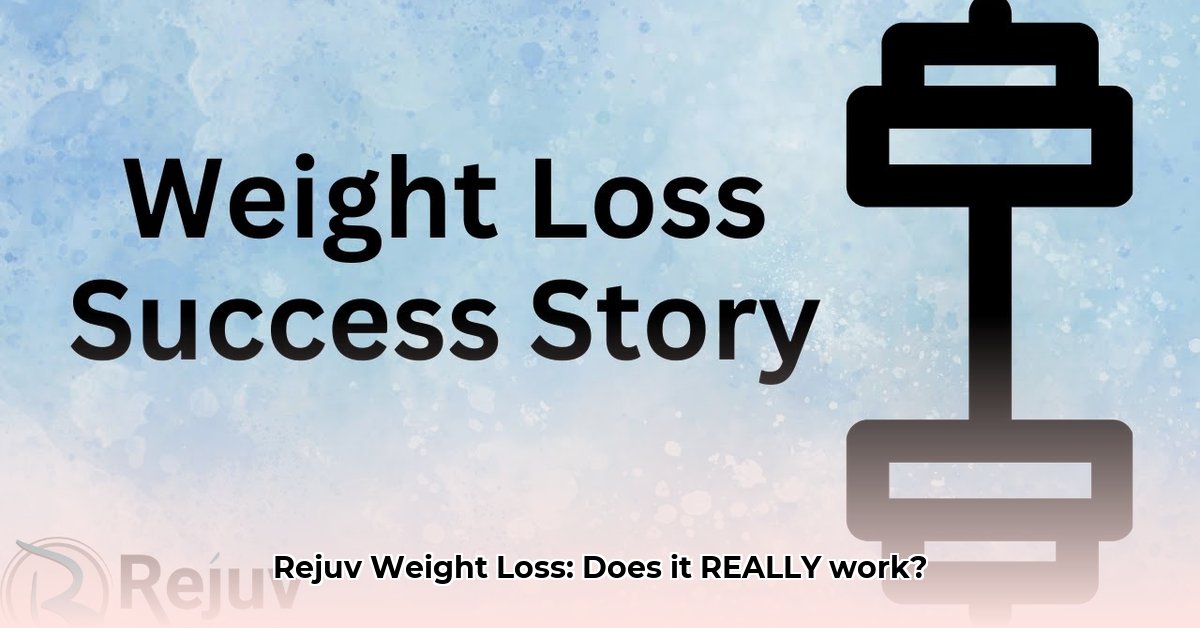
Rejuv Weight Loss: A Balanced Assessment of a Multifaceted Program
Dropping excess weight can be challenging. Many programs promise rapid results, but few deliver sustainable, healthy weight loss. Rejuv Medical offers a comprehensive weight loss program, combining personalized fitness plans, dietary advice, and medical interventions like Semaglutide injections, lipotropic injections, and peptides. While user testimonials are overwhelmingly positive, a critical review must address the lack of independent scientific verification. This review aims for an objective evaluation, presenting both the potential benefits and limitations of the Rejuv program.
Understanding the Rejuv Approach: A Holistic Strategy
Rejuv's program emphasizes a holistic approach, integrating four key components:
Personalized Fitness Plans
Rejuv designs custom workout routines tailored to individual needs and fitness levels. This personalized approach is advantageous, as generic programs often fail to account for diverse physical conditions and capabilities. However, it's crucial to ensure that trainers possess appropriate qualifications and experience to mitigate the risk of injury. Prioritizing correct form over intensity is paramount.
Nutritional Guidance
The program includes dietary recommendations intended to complement weight loss efforts. The specifics of this guidance warrant further scrutiny. Does it advocate sustainable, long-term dietary habits or promote restrictive, short-term diets? Sustainable lifestyle changes are more likely to lead to lasting weight management.
Semaglutide Injections
Semaglutide is a key component of the Rejuv program. This medication functions by suppressing appetite, which can aid in weight loss. However, potential side effects include nausea, vomiting, and—rarely—pancreatitis. A physician should thoroughly discuss the risks and benefits, especially considering pre-existing health conditions. Regular medical monitoring is essential. "Semaglutide, while effective for some, isn't a magic bullet," says Dr. Anya Sharma, Endocrinologist at the Mayo Clinic. "It's crucial to understand the potential risks and side effects."
Lipotropic Injections and Peptide Therapy
Lipotropic injections aim to enhance metabolism and liver function, potentially accelerating fat burning. However, localized pain and allergic reactions are possible. Peptide therapy's role in the program aims to further boost metabolism and reduce hunger. Yet, research on both the long-term effects and potential risks of these therapies remains limited. Independent, rigorous clinical trials are needed to validate their efficacy and safety. "More research is crucial before making definitive claims about the effectiveness of lipotropic injections and peptide therapies for weight loss," explains Dr. David Lee, a specialist in metabolic medicine at the University of California, San Francisco.
User Experiences and the Critical Need for Scientific Validation
Numerous online testimonials highlight significant weight loss and increased energy levels following the Rejuv program. These anecdotal reports are compelling, yet it's vital to remember that individual experiences do not constitute scientific proof. Weight loss is influenced by numerous interacting factors, making it difficult to isolate the effects of any single intervention. The absence of robust, independent scientific research remains a significant concern. Large-scale, randomized controlled trials are necessary to validate the program's efficacy and safety across diverse populations and to compare it against other weight loss methods.
Actionable Steps: A Guided Approach
Considering the Rejuv program? Follow these steps for a safe and informed approach:
- Thorough Research: Gain a comprehensive understanding of all aspects of the program. Don’t rely solely on marketing materials; seek independent reviews and information from trusted sources.
- Physician Consultation: Discuss the program with your doctor to assess your health status and potential risks or interactions with existing medications. Your doctor can provide personalized guidance and assess your suitability for the program.
- Realistic Goals: Sustainable weight loss requires time and effort. Avoid setting unrealistic expectations; focus on gradual, healthy progress.
- Long-Term Sustainability: Plan for maintaining weight loss after the program concludes. The program should serve as a stepping stone towards a healthier lifestyle, not a short-term fix.
Risk Assessment: A Balanced Perspective
It's crucial to acknowledge potential risks associated with the various components of the Rejuv program. The table below outlines potential benefits and risks of each element:
| Component | Potential Benefits | Potential Risks | Considerations |
|---|---|---|---|
| Semaglutide | Significant weight loss, improved blood sugar | Nausea, vomiting, pancreatitis, other side effects | Requires strict medical supervision and careful monitoring. |
| Lipotropic Injections | Enhanced fat metabolism | Allergic reactions, pain at injection site | Allergy testing is crucial. Consult with your healthcare provider. |
| Peptides | Increased metabolism, appetite suppression | Unknown long-term effects, potential drug interactions | Limited scientific data; proceed with caution. |
| Personalized Training | Improved fitness, increased muscle mass | Risk of injury with improper form | Must be performed under the guidance of trained professionals. |
Conclusion: A Cautious Yet Hopeful Outlook
Rejuv Medical's weight loss program presents a comprehensive approach supported by positive user testimonials. However, the absence of robust scientific evidence requires a cautious assessment. Success likely depends on individual factors and strict adherence to the program guidelines. Consulting your physician before initiating any weight-loss program, especially those involving medication or injections, is paramount. Thorough research and realistic expectations are vital for a safe and effective weight loss journey.
How to Verify Rejuv Medical Weight Loss Program Effectiveness: A Critical Analysis
Rejuv's effectiveness remains unproven by independent scientific testing. While the program's components individually show some promise, their combined impact requires further study. Evaluating testimonials is important but should not be seen as definitive proof. Therefore, critical evaluation and individual consultation with healthcare professionals remain strongly advised.